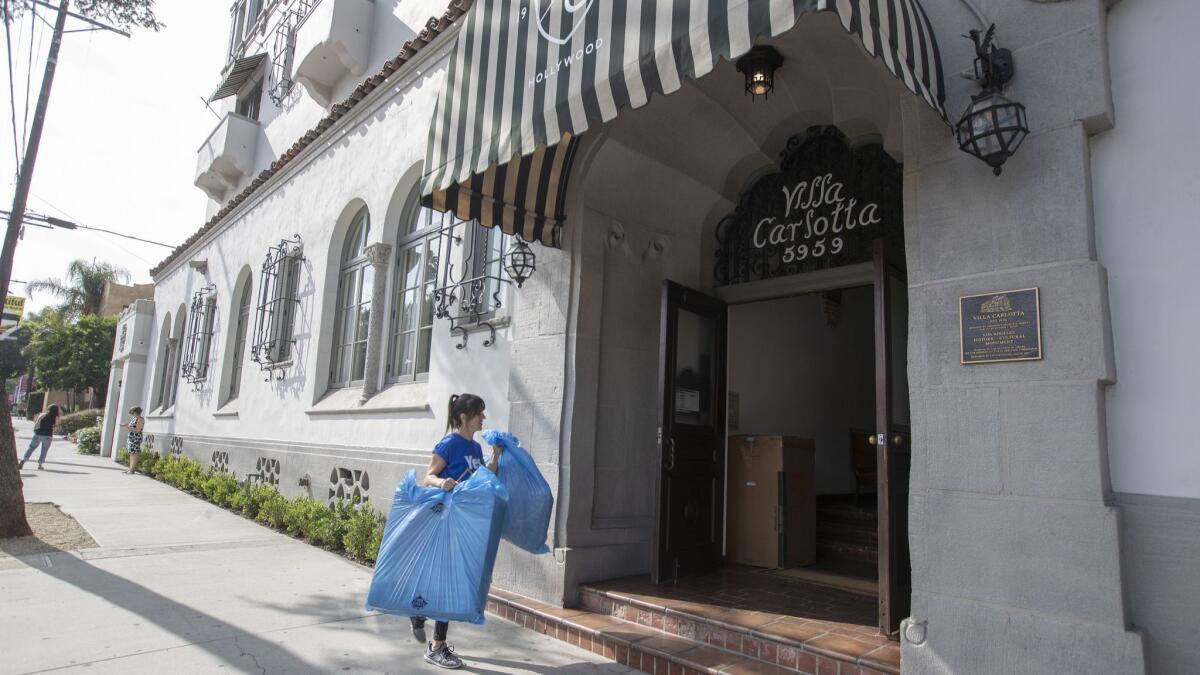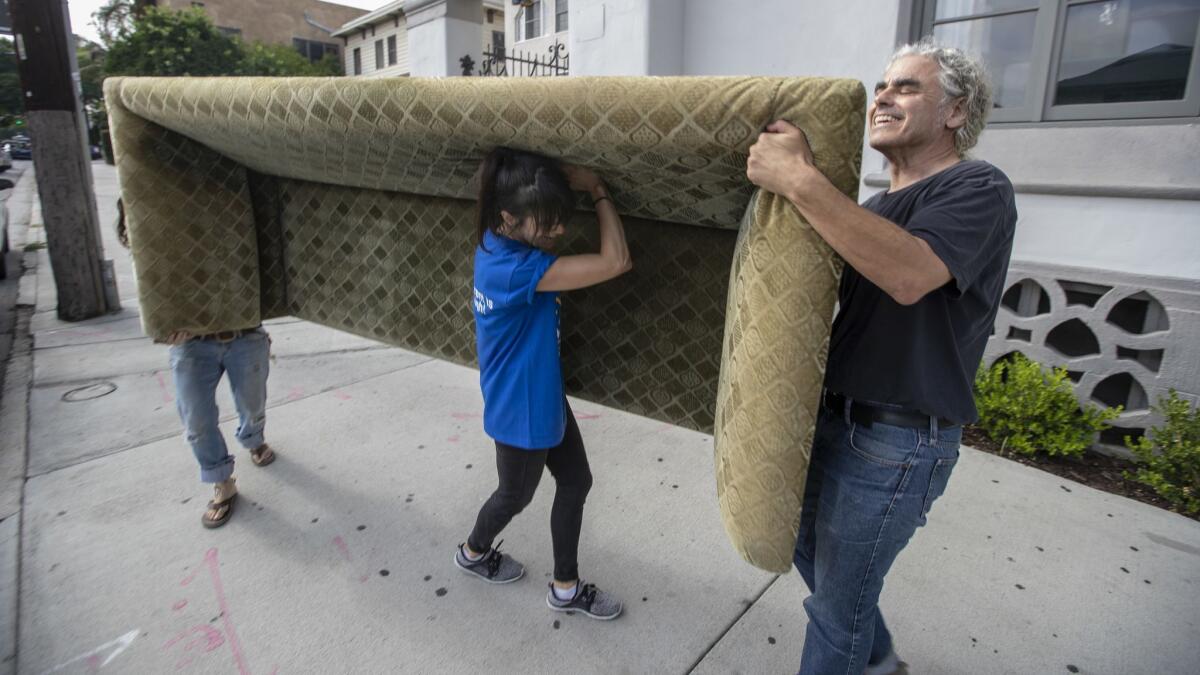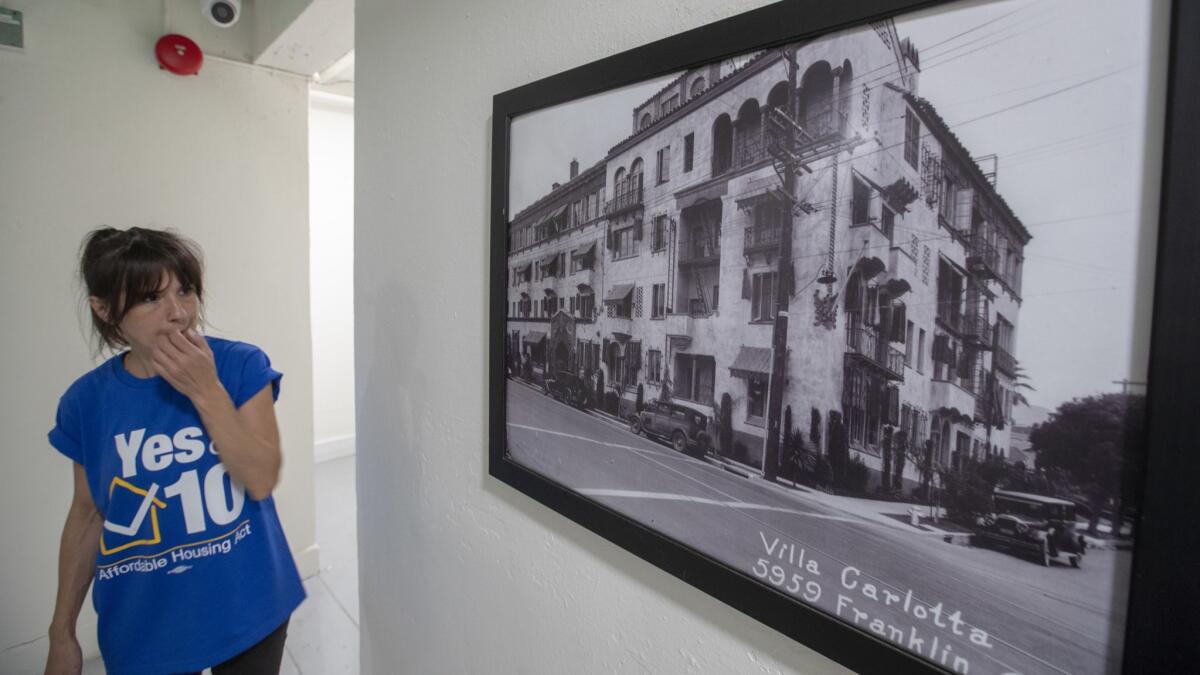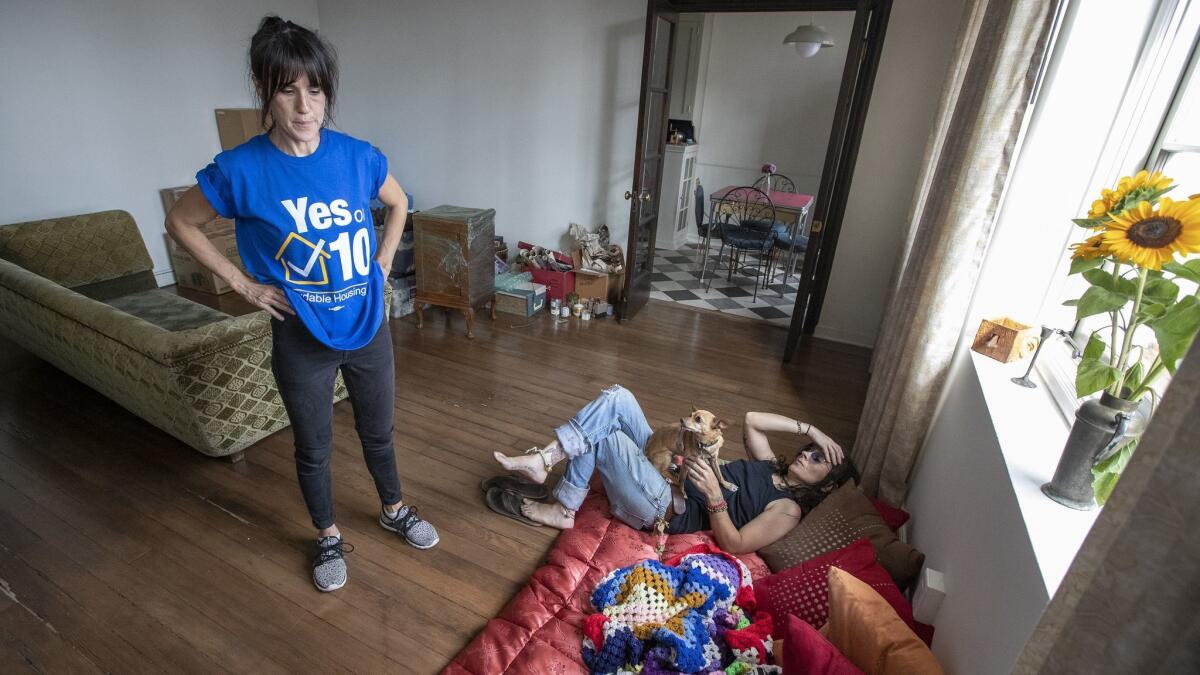Tenants got a rare chance to come back after being evicted — but most didn’t

- Share via
Two years ago, when she was booted from her airy apartment on Franklin Avenue, Sylvie Shain was packing up until nearly midnight.
Now she and her friends were lugging it all back up to her door at the Villa Carlotta: a vintage stove in a sherbet shade of mint, a velvety couch said to have once graced the Chateau Marmont, boxes heavy with knickknacks she never had the heart to cull when she was evicted.
Back then, “I was the little guy and there was no way I was going to win,” Shain recalled one afternoon. “Me going back is like the little guy winning.”
Shain and other renters lost their apartments after a new owner announced plans to turn the Villa Carlotta into a boutique hotel. When those plans fell apart, tenants got a rare chance to come back.
That right to return is a safeguard for renters displaced under the Ellis Act, a state law that allows landlords to evict tenants from rent-controlled units if they are tearing down a building or getting out of the rental business. Under L.A. city rules, if the landlord promptly backs out of those plans and leases the apartments again, former tenants are allowed to return at roughly the same rents.
But tenant activists say it rarely works out that way.

‘Slim to none’
Shain may be the little guy, but she is an unusually savvy one — a founding member of the Los Angeles Tenants Union who fought the evictions and now advocates for other renters at City Hall. And she is the only tenant to come back to the storied building below the Hollywood Hills.
Some of her neighbors had accepted buyouts from the owner to leave the Villa Carlotta and said they were told they had relinquished their right to return. Others found it impractical or unappealing to come back.
“It’s a tremendous burden for a tenant to move out and find a place and lay down roots somewhere else,” said Larry Gross, executive director of the Coalition for Economic Survival, a tenant advocacy group. “Once they’re out, the likelihood that they’ll go back is almost slim to none.”
CGI Strategies, which owns the Villa Carlotta, withdrew plans to turn the building into a hotel two years ago, in the face of opposition from City Councilman David Ryu. At the time, the company said it still planned to restore the historic building for another use.
The Villa Carlotta is now marketed as a sophisticated hideaway for extended stays of roughly a month or more. Furnished apartments with Nespresso machines and Apple TV have been advertised online for around $4,500 a month, with bigger units going for roughly $8,000.
That far exceeded what tenants were paying when it was a bohemian hangout with peeling paint and leaky plumbing, where neighbors shared a giveaway pile in the lobby and gathered for Thanksgiving dinners. But because the apartments were being rented out again, Shain and other tenants had the right to come back at close to their old rents.
When Rick Guidotti got that news, however, he also got a phone call from a Villa Carlotta attorney who nixed the idea.
The reason? At the time of the evictions, Guidotti and his partner made a deal with the building owner to clear out, he said. CGI was offering them much more money to relocate than they would otherwise be entitled to under city rules, according to Guidotti.
Such buyouts can involve giving up some rights, tenant advocates say, although the exact details hinge on the wording. Guidotti said the deal mentioned waiving “future rights.”
He and his partner now live in an apartment across the street, he said, paying more than twice as much for a much smaller unit in the same neighborhood that Guidotti had lived in for decades.
“I’m just burning through that money,” said Guidotti, a guitarist who used to play with the Turtles. “I could go out and look for a job, but I’m almost 70 years old.”

Many of the displaced tenants accepted some kind of buyout before leaving. A few could not be reached, according to the housing department, which attempted to contact former residents from all the units that had been vacated. Shain said she heard from others who found it impractical to move, including one who had just signed a new lease.
CGI Strategies declined to comment, except to say that it was complying with the Ellis Act. Under city rules, it is also obligated to initially rent out the units that were vacated at the same rates as before, plus any annual increases allowed under rent control, according to the housing department.
Shain, who was paying roughly $1,700 for a one-bedroom unit in Westlake, will save hundreds of dollars a month at her old apartment with its Juliet balcony and 1920s charm.
Despite the changes — the renovated lobby with its breezy music, the disappearance of the old cast of characters in the courtyard — it felt reassuring to be back at her second-floor apartment.
And she relished returning to her familiar neighborhood, where residents at other buildings had helped her when she had knee surgery, bringing her meals and walking her tiny dog, Brad Pitt.

Thousands of units taken off market
It is unclear how many Los Angeles tenants have gotten the same chance, but it appears to be rare.
Housing officials had records of only eight L.A. addresses, including the Villa Carlotta, where landlords withdrew apartments under the Ellis Act in the past five years and later informed the housing department they were going back on the rental market. The department does not track whether people came back.
Both Steven Luftman and Jen Getz, the friends who helped Shain lug her couch back to her apartment, said they too had been displaced by Ellis Act evictions. Across Los Angeles, more than 24,000 units have been withdrawn under the law since 2001, according to the Coalition for Economic Survival.
”I’ve never seen a client return,” said Inner City Law Center supervising attorney Ingrid Arriaga, who isn’t representing Villa Carlotta tenants. In some cases, “they probably don’t feel comfortable moving back.”
An unusual exception was the battle over Lincoln Place, a Venice garden apartment complex that was up for demolition a decade and a half ago. The lengthy saga ended with a settlement that allowed dozens of former tenants to come back.
Beyond the Ellis Act, promises of a “right to return” have been floated in L.A. amid concerns about tenants being displaced by new construction.
City Councilman Mitch O’Farrell recently announced that tenants displaced by the Crossroads Hollywood project would be guaranteed a place in the new buildings at their existing rents, plus any allowable increases under rent control, under an agreement with Harridge Development Group.
Another developer, Bob Champion, made a similar pledge for another Hollywood development last year.
Last month, nonprofit developer Abode Communities vowed that tenants would have the right to come back once a new affordable housing project arose at the Westlake site now occupied by their bungalows, although community activists complained some might not be eligible.
And during the debate over Senate Bill 827, which would have allowed cities to ramp up housing development near rail stops, state Sen. Scott Wiener (D-San Francisco) said that any tenants displaced by construction would have a right to come back to a new building. But tenant activists said that wouldn’t reverse the damage.
Earlier this year, Assemblyman Richard Bloom (D-Santa Monica) unsuccessfully pushed a bill to make it easier to return after Ellis Act evictions and extend possible penalties for “abuses.”
Earle Vaughan, president of the Apartment Assn. of Greater Los Angeles, argued the law is strict enough and that tenants have other protections, including as much as $20,000 in relocation aid under city rules.
“If somebody is going to pay that kind of money, there must be a real reason,” Vaughan said, describing the Ellis Act as a “safety valve” for building owners unable to cover their costs in the rental business.
Shain argued that change was needed to help tenants exercise their rights.
“It’s difficult to navigate,” said attorney Aimee Williams, who assisted Shain through the process. “Even with an attorney. Even as an English speaker. It’s something that a lot of tenants are not equipped to deal with.”
Twitter: @AlpertReyes
More to Read
Sign up for Essential California
The most important California stories and recommendations in your inbox every morning.
You may occasionally receive promotional content from the Los Angeles Times.














